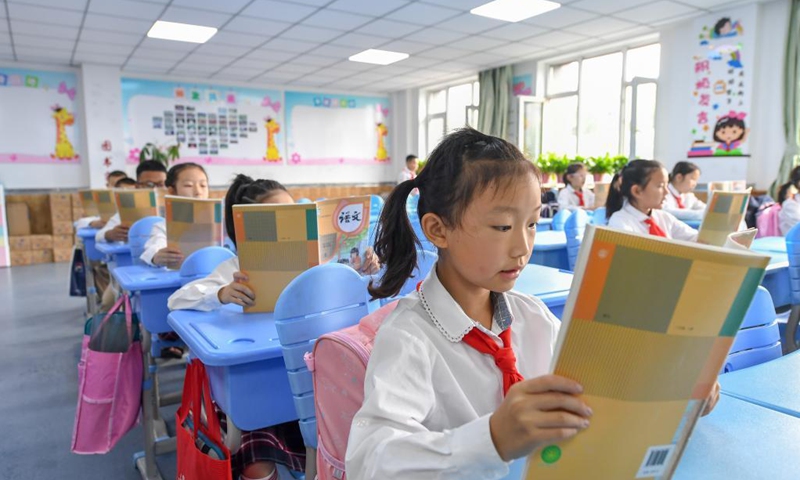
Primary students read in the morning session at a school in Changchun, capital of northeast China's Jilin Province, Aug. 23, 2021. Primary and middle schools in Changchun greeted their new semesters on Monday. (Xinhua/Zhang Nan)
In what will be the first semester after China issued a guideline to ease the burden of excessive homework and off-campus tutoring for students, the Chinese Ministry of Education on Monday specified a number of requirements, including the removal of final written exams in some primary school grades and the canceling of elite classes in middle schools, with the aim of further lifting pressures off students as well as parents during compulsory education years.
In a notice released by the ministry on Monday, it specified that first and second grades of elementary schools should not arrange written examinations for students. For other grades, schools should organize one final examination every semester. Junior high schools can arrange one midterm examination based on the progress of different subjects.
The notice added that difficulties of exams should be set within a reasonable scale, and any questions beyond normal teaching schedule must be strictly avoided. Meanwhile, midterm and final exam results should be given by grades instead of scores.
The test results will no longer be ranked or announced in public, but instead, schools should inform parents and students the results in an appropriate manner. Adjusting seats or classes, or labeling students according to grades should also stop.
More focus should be put on the comprehensive qualities of students, their learning habit, performance, learning ability and innovative spirit, and there should be balanced arrangement for exams, homework, routine assessment and quality monitoring, the ministry said, as well as learning abilities and innovative thinking.
Starting from the new semester, there will be no more categorization of students into regular and elite classes, education authorities said at the press conference along the release of the notice on Monday, to ensure the allocation of teaching resources are balanced among all students in compulsory education years.
In recent years, conflicts between schools and students' parents have become increasingly prominent after some parents voiced dissatisfaction to schools assigning tasks to them, which they believe should have been the work of the teachers but instead have somehow fallen onto them. Such voices soon gained wide support among Chinese netizens, who called upon relevant departments to give a solution and stop putting more pressures on parents who are already working their fingers to the bone.
Addressing these issues, education authorities said that assigning tasks to parents is strictly forbidden, nor is asking parents to grade students' homework. Repetitive homework intended for punishment has also been banned.
But that is not the whole picture of the problem. The pressure to outcompete others begins at an early age in China from securing a place at a good kindergarten, getting into a "key school" to finding a place at an elite university. This has pushed many parents to send their children to attend various after-school training classes in order to get an edge on exams amid fierce competition. The phenomenon is well reflected in a recently created popular buzzword Neijuan, or "internal competition," where every stakeholder, from students, parents and teachers, is stuck in an emotionally and physically draining rat race.
As part of the efforts to address the problem, the Monday press briefing also cracked down on after-class tutoring, saying that schools must not increase class hours or adjust the teaching schedules at will, and teachers must not teach new contents during after-school time.
Instead, after-class services that enrich students' spare time will be encouraged. Teachers can follow a flexible working time, and additional subsidies will be given to teachers participating in after-class activities. Retired teachers, qualified social professionals and volunteers are welcome to join these activities, the ministry said.
Chinese authorities introduced a set of guidelines in July to ease the burden of excessive homework and off-campus tutoring for students undergoing compulsory education. It details requirements in areas including reducing homework and improving the quality of education and after-class services provided by schools. It specifies that governments should stop approving establishment of new off-campus curriculum subject-tutoring institutions, and existing ones should be registered as non-profit institutions.
Global Times




